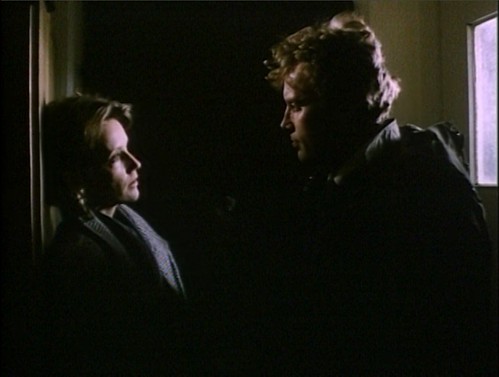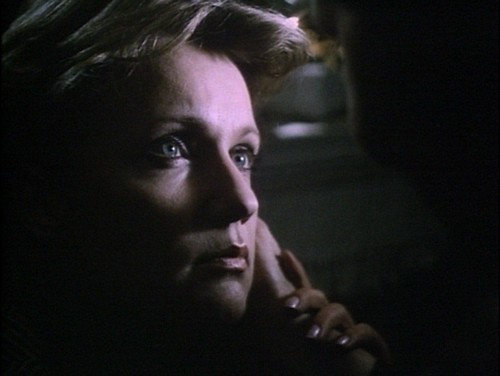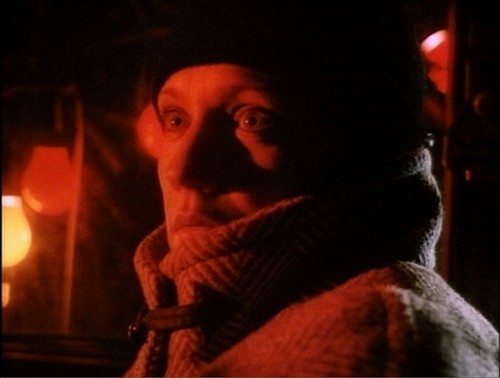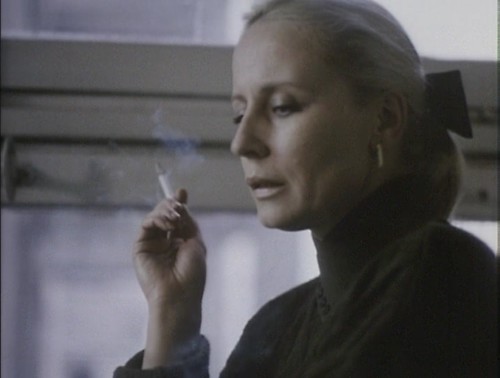Director: Krzysztof Kieslowski
Screenplay: Krzysztof Kieslowski and Krzysztof Piesiewicz
Starring: Daniel Olbrychski, Maria Pakulnis, and Joanna Szczepowska
Images from 2003 Facets release of The Decalogue.

On Christmas Eve, the air is charged with a sanctified air; the feeling that the day will be perfect and holy, or at least, the feeling that it ought to go that way. It's kind of like church: a special time and place where you stay indoors, spend time with your family, and avoid impure thoughts or actions. But the idea of the Sabbath—whether it be Saturdays, Sundays, Christmas, or Easter—is a human construct subject to human compulsions.
The sanctity of the day (or the place) is only as strong as we're willing to make it. In and of itself, it has no meaning. Decalogue III hardly endorses a strict interpretation of keeping the Sabbath holy. If anything, having Janusz spend Christmas Eve and Morning with his former lover Ewa proves more cathartic and redemptive than sinful. In this sense, it's iconoclastic of the 3rd Commandment.
By iconoclasm, I don't mean the Byzantine kind; Decalogue III's iconoclasm is more progressive than that. The old kind was where religious images were banned because they were an inaccurate representation of Christ; things like paintings or sculptures desecrated Christ's true image because they could only show his human likeness—any depiction of his divinity being impossible in a physical medium. The argument behind Byzantine iconoclasm was that depictions of a physical Christ were forms of pagan idol-worship. That is, the symbol itself was being worshipped and not what it represented or implied.
The problem with Byzantine iconoclasm is that it enforces a dogma that restricts our freedom of interpretation; forcing us into a singular way of understanding and respecting Christ's sacrifice. It grants no latitude for other sects and denies tolerance. This leads to another form of idol worship; the metaphysical image of Christ being such a holy one that it cannot even be represented physically, much less questioned. Any questioning or defiance of the decree is viewed as an act of blasphemy, and there is no leeway in understanding the offender's motivations or situation.
The rule being enforced—that Christ's image is so sacred as to be impossible to depict physically—is not unlike a strict adherence to the Commandments themselves. Such an interpretation—one that denies any good coming from defying the Commandments—forgoes one of Christ's most important teachings: forgiveness. Forgiveness, in my mind, is necessarily preceded by empathy and tolerance. Without these, how can we hope to forgive someone's actions? We may say we forgive them, but for us to mean it, isn't it necessary that we understand their feelings and motivations?
The Commandments can't be treated as the immovable object. We can't say: "uh-oh, you didn't keep the Sabbath holy. Blasphemy!" because it simplifies the human condition; it denies any possibility for exception even though we know the world can't simply be divided into good and evil—it's a big gray area. It is human to err. We must be willing to forgive mistakes and moreover, understand and empathize with them. This is where Decalogue III works so well: in subverting our preconception that Christmas Eve ought to be holy—that any defiance of this is sacrilege.

In the beginning, Janusz feels that no good can come from spending all Christmas Eve with Ewa, his ex-lover. We, too, aren't exactly sure what game Ewa is playing. She tells Janusz that her husband has gone missing and she needs help looking for him—on Christmas Eve of all days. She parks the car herself in the median but says her husband must have abandoned it. Then she calls the hospital to report her husband had been injured on the street, even though she hasn't even seen him. She does these things to string Janusz along; she's throwing a false trail of bread crumbs to keep him with her all night.
Her motives are unclear for us until the end, in part because, like Janusz, she's stringing the audience along as well. She must be lonely though, we at least know that much; her only family is a senile aunt at a retirement home. Her aunt kindly asks her about her homework and Ewa obliges—it's obvious this has become a routine by the way Ewa tries to keep a smile. This is a smile done out of courtesy, not happiness. It's a small comfort when your only family member doesn't even know your age and for Ewa, it's a slippery slope trying to keep face; her inability to maintain a smile is a dead giveaway.

Her motives are almost understandable. Her only contact with family is this rather pitiful scene with her aunt; a few minutes of humoring an old woman who doesn't even know her age. She loves her aunt—that's painstakingly clear—but it's a small consolation. Part of her is thinking: Gee, thanks [God]. I get to wake up my auntie for a few minutes on Christmas Eve only to have her fall asleep again in the middle of our "conversation." We also see Ewa stopped at a red light; she is looking at a father and son playing in the snow. Images like these are not insisted upon, but they hint at a loneliness and stasis, and make Ewa's rather bizarre, attention monger-ish behavior almost justifiable.
Janusz probably doesn't even understand Ewa's loneliness at first. Having seen Ewa eye him earlier at Mass, he knows something is up. Later, he unplugs the doorbell, hoping to avoid any surprise visits from Ewa. But she calls anyway, with Janusz apprehensive about answering the phone. He knows what awaits—or rather, he thinks he does—but goes along anyway because he wants to avoid conflict with his wife. His wife holds a similar restraint; aware that Ewa is probably calling, with the camera training on her, she stops at a distance because she isn't the contentious type.
There's a fear in her eyes; it's as if she too, knows the outcome but is incapable of stopping it. She's probably confronted Janusz before about his affair, but tonight, she can't bring herself to conflict. It could be because it's Christmas Eve and she's too surprised to act, or it might be that she's willing to let tonight's events take their course. It is the latter possibility that I find more enriching and humanist; she trusts her husband to make the right choice. As it turns out, this night will prove beneficial for everyone; providing Janusz and his wife with closure and Ewa with catharsis.
It is only when Ewa reveals her situation that her bizarre actions not only become identifiable, but more importantly, something we can empathize with. The night has been strange—almost like a mini-Eyes Wide Shut—ranging from Ewa manufacturing false clues to her husband's whereabouts, the two going to the morgue and wondering who is rejoicing the death of the man before them, Janusz fighting the sadistic guard, Ewa's suicidal attempts to drive them off the road, and the parking lot attendant skateboarding down the ramp.

It is at that parking lot that Janusz finally learns that Ewa's husband left her three years ago. For her, this has hardly been fair. They both were caught in the affair, but he gets to happily spend Christmas Eve with his wife and kids while she sits alone in her apartment. Her goal is to spend the entire night with Janusz and by the end, make him understand and empathize with her feelings. She says it's kind of like a game; she feels that if she can get through the night with Janusz, she'll be able to move on. While we may raise our eyebrows, is her superstition any stranger than our obsession with holidays or the Sabbath? If this is the way she finds closure, shouldn't we grant her that small allowance? Janusz's breaking of the 3rd Commandment effectively saves a life; Ewa drops her suicide pill, no longer needing it.
Decalogue III subverts the rigidity of the 3rd Commandment, claiming that we can't deal in absolutes. If someone needs us, then what value does the commandment have? It doesn't make sense to ignore the person standing next to you just because it's Christmas Eve. But that isn't to say the Sabbath is bad either; it, like Ewa's superstitious game, helps ground us and even proves cleansing and cathartic. In the end, Janusz and his wife achieve their closure through a simple, knowing exchange:
"Ewa?"
"Ewa."


